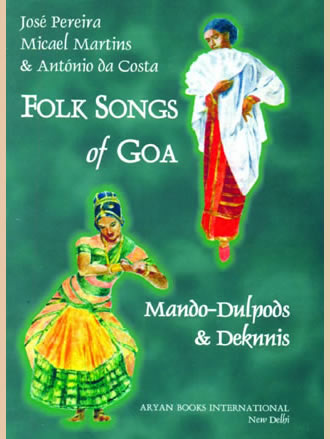FOLK SONGS OF GOA : Mando-Dulpods & Deknnis
FOLK SONGS OF GOA : Mando-Dulpods & Deknnis is backordered and will ship as soon as it is back in stock.
Couldn't load pickup availability
Genuine Products Guarantee
Genuine Products Guarantee
We guarantee 100% genuine products, and if proven otherwise, we will compensate you with 10 times the product's cost.
Delivery and Shipping
Delivery and Shipping
Products are generally ready for dispatch within 1 day and typically reach you in 3 to 5 days.
- Total Pages: xxvi + 86
- Format: HB (Hardback)
- ISBN: 9788173052804
- Edition: 1st
- Publisher: Aryan Books International
- Book Size: 15 cm x 22 cm
- Year of Publication: 2005
Konkani Song, of which Goan Song is the preeminent branch, is a treasury of the traditional music of the Indian subcontinent. It has at least 35 types, monophonic and harmonic, the former prevalent before the Portuguese brought Western music into India, and the latter, consequent to the Western impact. It was in Goa that Indian musicians first began to compose in Western musical forms, incorporating into them motifs and nuances of their own immemorial tradition. Among these 35 types four were created to accompany social dancing; the Mando, the Mando-dulpod, the Dulpod, and the Deknni. The Mando, the finest creation of Goan Song, is a slow verse-and-refrain composition, in six-four time, dealing with love, tragedy and contemporary events, both social and political. Aryan Books International has published two volumes on the Mando, entitled, Song of Goa, Vol. 1: Mandos of Yearning (2000); and Vol. 2: Mandos of Union and Lamentation (2003). While the Mando is an art song, the remaining three types represent Goan folk song. The Mando-dulpod is a slower variety of the Dulpod (or a quicker sort of Mando), also in six-four-time, facilitating the transition from the slow rhythm the Mando to the quicker one of the Dulpod. The Dulpod itself, in six-eight time, is typically descriptive of everyday life in traditional Goa, particularly that of the Christians. The Deknni (?song of the Deccan??) is a song imitating Hindu music in the musical idiom current among the Christians, in two-four or six-eight time, descriptive mostly of Hindu life, with special attention given to the temple dancers. The present volume contains examples of the Mando-dulpod and the Deknni. Hopefully a future volume will be devoted to the Dulpod.





